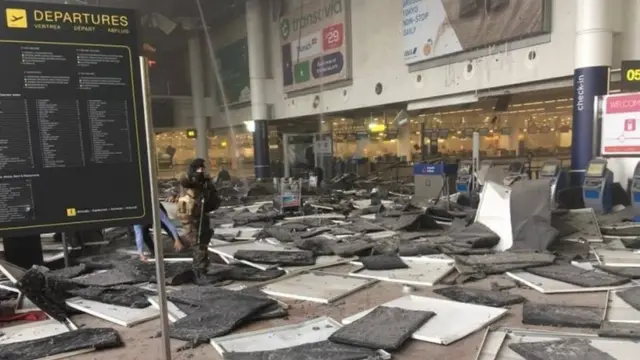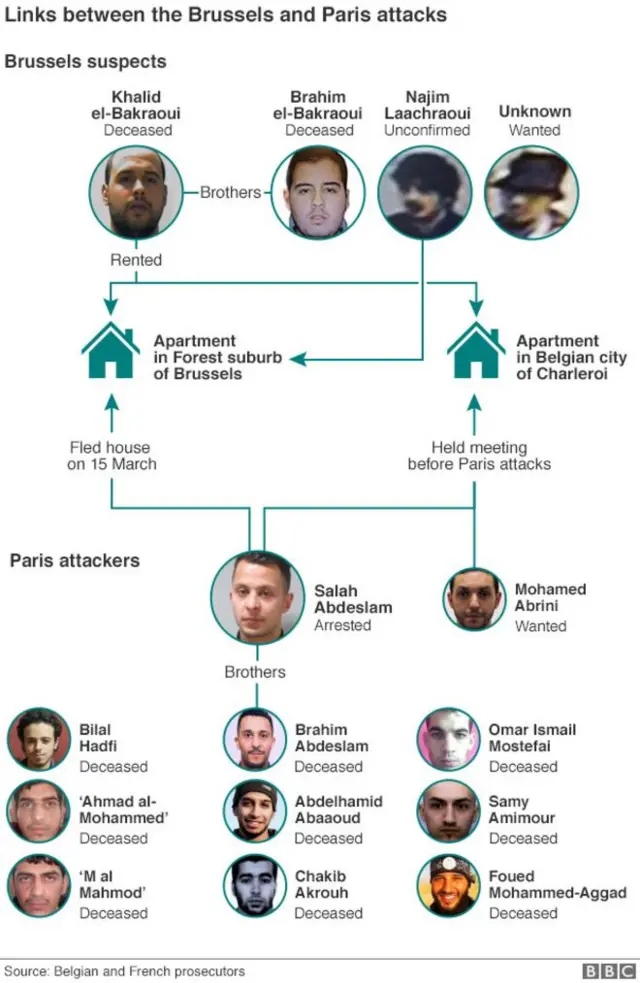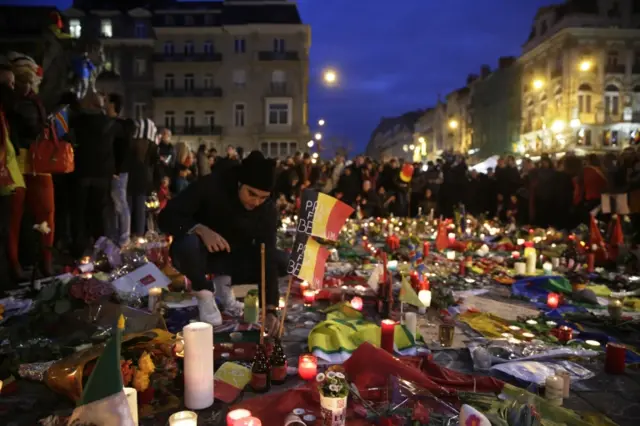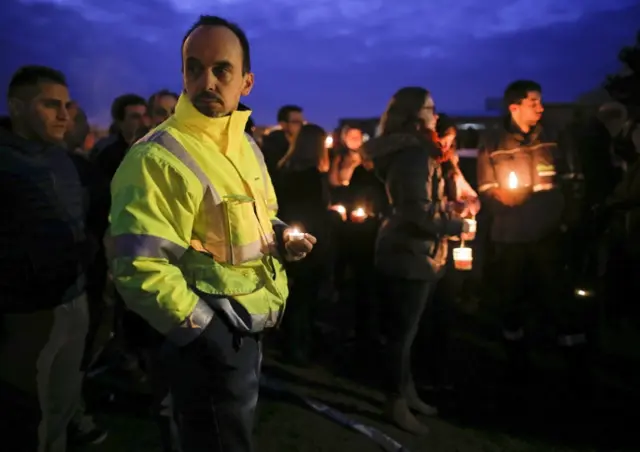Coverage concludespublished at 22:32 GMT 23 March 2016
And that concludes our coverage for this evening, we will be resuming on Thursday morning.
You can still follow the latest updates via the main news story.
EU interior and justice ministers due to hold a crisis meeting in Brussels
More than 60 people still in a critical condition following the blasts, medical officials say
Two suicide bombers named by prosecutors as brothers Khalid and Brahim el-Bakraoui
Airport blasts killed at least 11 while 20 died in explosion at Maelbeek metro station
So-called Islamic State has said it was behind the attacks
Alastair Lawson
And that concludes our coverage for this evening, we will be resuming on Thursday morning.
You can still follow the latest updates via the main news story.
As EU interior and justice ministers prepare for Thursday's talks in Brussels to discuss how to deal with jihadist attacks in Europe, the BBC's Katya Adler in the Belgian capital predicts that the meeting will not be an easy one.
Taking into account a forthcoming referendum in Britain on EU membership and recent strident nationalistic statements by some EU members, our correspondent says the idea of a more unified European response to the jihadist threat is "not going to be very digestible" for some European governments.
BBC's Anna Holligan in Brussels tweets:
Allow X content?
This article contains content provided by X. We ask for your permission before anything is loaded, as they may be using cookies and other technologies. You may want to read X’s cookie policy, external and privacy policy, external before accepting. To view this content choose ‘accept and continue’.
Nicolas Henin, the French journalist who was for months held hostage by the so-called Islamic State in Syria, writes in the Guardian newspaper, external that while the Brussels attacks had a lower death toll than those in Paris last November, they have a different significance.
Quote MessageThe Brussels attack marks the migration of terror from one country to the next. Suddenly everyone is saying: who is the terrorist, and where will they strike next – the UK? Germany? The Netherlands?
But while Khalid and Brahim el-Bakraoui and, reports say, Najim Laachraoui performed their duty to die as "cannon fodder" for IS, Mr Henin says that the unwillingness to kill himself of another militant - Salah Abdeslam, who has been arrested - represents an opportunity.
Quote MessageFirst in Paris and now in Brussels, he has twice refused to meet his death. Perhaps there are signs of hope in this, for it shows that if there is a weakness in Isis, it is that there are humans in its ranks
Mr Henin says how Europe reacts now will be crucial - but, he says, the omens are not good. Already French President Francois Hollande has, he says, "fallen into the trap" of referring to this challenge as a war.
Quote MessageWe have seen large-scale political violence before in our history. If we adopt a militaristic, warlike vocabulary, there will be no way back from that. We will only strengthen our enemies
RTBF is now also reporting that the Rue de la Loi street and two tunnels closed after Tuesday's attacks have now re-opened.
Allow X content?
This article contains content provided by X. We ask for your permission before anything is loaded, as they may be using cookies and other technologies. You may want to read X’s cookie policy, external and privacy policy, external before accepting. To view this content choose ‘accept and continue’.
Earlier, a group of Belgian Muslims brought a message of peace to the centre of Brussels.
Belgium's RTBF public broadcaster has reported that Brussels' metro system will be operating from 07:00 local time (08:00 GMT) to 19:00 only, and access to train stations will be limited.
Allow X content?
This article contains content provided by X. We ask for your permission before anything is loaded, as they may be using cookies and other technologies. You may want to read X’s cookie policy, external and privacy policy, external before accepting. To view this content choose ‘accept and continue’.
When Belgian police raided an apartment in the Schaerbeek area of Brussels, linked to the attackers, they found bomb-making materials, including 15kg (33lb) of TATP.
This powerful DIY explosive was also used by terrorists in Paris and in the 2007 London bombings.
What led to the Brussels attacks and are Belgium's security forces able to cope with the Islamist threat?
Read More Image source, PA
Image source, PADetails are continuing to emerge about what happened yesterday, including the identities of the suicide bombers. A manhunt is still underway for a third airport attacker, so far unnamed, whose device failed to detonate.
Here is a comprehensive round up what we know so far - and the suspected links between the Brussels and Paris terror attacks.


Allow X content?
This article contains content provided by X. We ask for your permission before anything is loaded, as they may be using cookies and other technologies. You may want to read X’s cookie policy, external and privacy policy, external before accepting. To view this content choose ‘accept and continue’.
Daniel Byman, external, an extremism expert at Georgetown University and the Brookings Institution, writes in the New York Times, external that while the group Islamic State (IS) may be on the defensive in Iraq and Syria, it is lashing out abroad and Europe is emerging as a "key battleground".
Mr Byman says that returnees from Syria and Iraq are linking up with locals, creating a "self-sustaining cycle of violence".
Quote MessageThe first volunteers were motivated primarily by adventure or out of a sense of defending their community, but now friends are recruiting friends, promising glory and God
Quote MessageAcross the Continent, Muslims often feel alienated from the broader population. In the US, many plots are disrupted because the American Muslim community reports them to the police and the FBI; such trust is lacking in Europe
Quote MessageThe rise of far-right, xenophobic political forces, like the National Front in France or Alternative for Germany, will do little to improve relations between European Muslims and their governments
Quote MessageUnfortunately, the Western response in Iraq and Syria is much more promising than efforts to stop terrorism in Europe
Allow X content?
This article contains content provided by X. We ask for your permission before anything is loaded, as they may be using cookies and other technologies. You may want to read X’s cookie policy, external and privacy policy, external before accepting. To view this content choose ‘accept and continue’.
"I had a chance to show... the world the face of terrorism," Kate Kardava, journalist
Journalist Kate Kardava was in Brussels airport at the time of the blasts. Photographs she took of the aftermath with her mobile phone have appeared in newspapers all over the world. She tells the BBC about her experience.
An IT programmer from Nottingham - David Dixon - has been missing since the terror attacks in Brussels.
Family friend Simon Hartley-Jones told the BBC that his partner Charlotte Sutcliffe has been searching the city's hospitals for him.
Mr Hartley-Jones describes his friend as an "amazing man who deeply, deeply loves his son".
BBC Europe Editor Katya Adler reports...
The BBC's Katya Adler: "Brussels is still digesting the full horror of Tuesday's attacks"
 BBC Monitoring
BBC Monitoring
From BBC Monitoring:
Belgium's RTBF correspondent reporting from Brussels' Place de la Bourse - where a large crowd has gathered to pay tribute to the victims of the attacks - says the square "has taken on the appearance of the Place de la Republique in Paris in the aftermath of the Charlie Hebdo and 13 November attacks".
 Image source, AFP
Image source, AFPPeople have been tweeting their tributes to those caught up in the Brussels attacks:
 Image source, EPA
Image source, EPAOn Wednesday night, employees of Brussels' Zaventem airport took part in a "silent walk" to pay tributes to the victims of the attacks.
 BBC Monitoring
BBC Monitoring
In its special live coverage of the aftermath of the Brussels attacks, Belgian public service broadcaster RTBF continues to alternate between news updates, studio discussions with security experts and footage showing the crowds gathered in the Place de la Bourse in Brussels to pay tribute to the victims of the attacks.
Many people lit candles as darkness fell, and Moroccan, Tunisian, Turkish and other flags from all over the world were shown displayed alongside the Belgian flag.
One woman told the RTBF interviewer that she had come with her family in order to express her solidarity and "to find again the former Belgium". Asked what this Belgium meant to her, she said it was a country "in which people used to smile at each other and talk to each other".